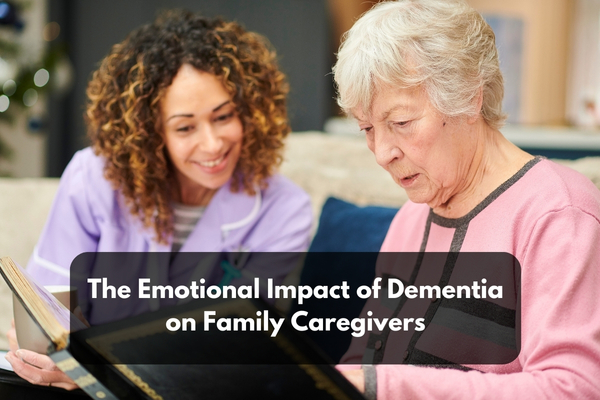Dementia exerts a profound emotional toll on family caregivers, intertwining feelings of grief, frustration, and exhaustion. Witnessing a loved one’s declining memory and personality shifts can evoke profound sadness and a sense of loss. Caregivers grapple with guilt, feeling inadequate at times. The relentless demands of caregiving often lead to emotional and physical fatigue, strain relationships, and diminish self-care.
What is Dementia Disease?
Dementia is a progressive neurological disorder characterized by a decline in cognitive function, affecting memory, reasoning, and daily activities. Symptoms include memory loss, confusion, and communication difficulties. Alzheimer’s disease is the most common form, alongside various other types. As the condition advances, individuals may undergo changes in personality, mood swings, and an overall decline in cognitive abilities. Dementia significantly impacts daily life and independence, necessitating substantial support from caregivers.
While treatments can alleviate some symptoms, there is currently no cure for dementia. Early detection and supportive care are crucial in managing the impact of the disease. The challenges posed by dementia highlight the importance of fostering understanding, empathy, and effective caregiving to enhance the quality of life for individuals and their families facing this complex condition.
What is the Emotional Impact of Dementia on Family Caregivers?
Confusion and Frustration
Dementia brings about a persistent state of confusion and frustration for individuals as they grapple with an increasingly unfamiliar world. Simple, once-routine tasks become daunting challenges, leading to heightened levels of frustration as cognitive abilities decline. The frustration stems from the stark awareness of their diminishing cognitive prowess and the difficulties encountered in navigating day-to-day activities.
Anxiety and Fear
The uncertain trajectory of dementia often induces anxiety and fear in those affected. Individuals may harbor anxiety about the future, fear the loss of cherished memories, or dread the inability to recognize familiar faces. This emotional distress can manifest physically, exacerbating the overall toll on the individual’s well-being and adding an extra layer of complexity to the caregiving process.
Grief and Loss
Dementia, with its relentless progression, prompts profound feelings of grief and loss in both individuals with the condition and their loved ones. Grieving the loss of cognitive abilities, independence, and shared memories becomes a poignant and ongoing process. Caregivers, in particular, experience a unique form of grief as they witness the gradual transformation of their loved ones.
Agitation and Aggression
Agitation and aggression are common manifestations of dementia, often fueled by the frustration of individuals grappling with the inability to communicate effectively or comprehend their surroundings. Managing these emotional outbursts becomes crucial for maintaining a safe and supportive environment, requiring caregivers to develop strategies to mitigate such behavior.
Emotional Resilience of Caregivers
Caregivers, often family members, bear a substantial emotional burden when supporting individuals with dementia. The constant adjustments to the evolving needs of those affected can take a toll on caregivers’ emotional well-being, leading to stress, burnout, and a range of other emotional challenges. Recognizing the emotional resilience required of caregivers is essential for fostering a sustainable caregiving environment.
Changes in Personality
The progression of dementia can lead to significant alterations in an individual’s personality. A once calm and collected person might become irritable, anxious, or exhibit impulsive behavior. Navigating these shifts in personality necessitates adaptability and empathy from caregivers and family members, who must learn to understand and accommodate these changes.
Nostalgia and Emotional Flashbacks
Dementia can trigger moments of nostalgia and emotional flashbacks, offering a unique window into an individual’s past. While recent memories may fade, distant recollections may surface with vivid clarity. These fluctuations in memory can evoke a mix of emotions, from joy to sorrow, further complicating the emotional landscape for both individuals and their caregivers.
Hope and Moments of Connection
In the face of the formidable challenges presented by dementia, there emerge moments of hope and connection. Whether facilitated by the transformative influence of music, involvement in artistic activities, or through sincere and simple gestures, individuals grappling with dementia may encounter brief instances of clarity and connection. These moments not only serve as sources of hope for caregivers and family members but also underscore the enduring humanity that prevails despite the cognitive hurdles. The role of music therapy in fostering these connections adds an additional layer of significance to these poignant encounters.
Loss of Emotional Connection
The strain that dementia places on relationships can result in a perceived loss of emotional connection. As individuals struggle to recognize loved ones or recall shared experiences, the bonds that once held families together may be tested. Patience, understanding, and adaptive communication are crucial components in navigating this challenging terrain and preserving the essence of meaningful connections.
Conclusion
Understanding the sentimental impact of dementia is paramount for providing compassionate and effective care. As we navigate the intricate emotional landscape associated with this condition, it becomes evident that empathy, patience, and a holistic approach are indispensable elements in supporting individuals with dementia and their families on this challenging journey. If you or a loved one are in need of dementia care services in Mckinney, TX, we encourage you to reach out to experienced dementia service providers who are trained in dementia care. With the right support, individuals with dementia can continue to thrive and enjoy life to the fullest.





